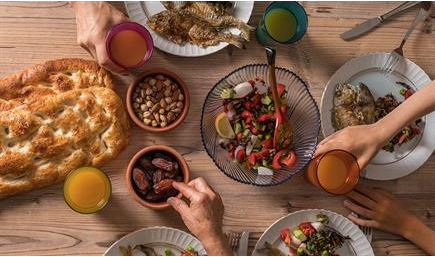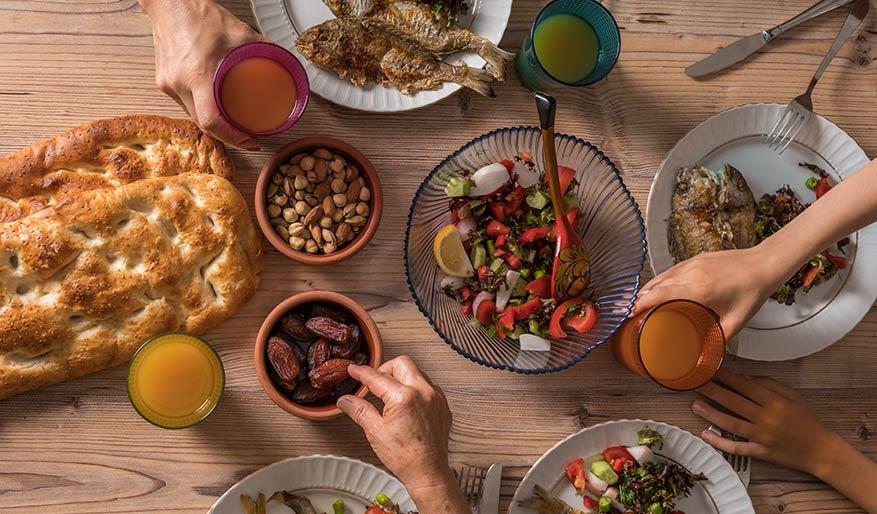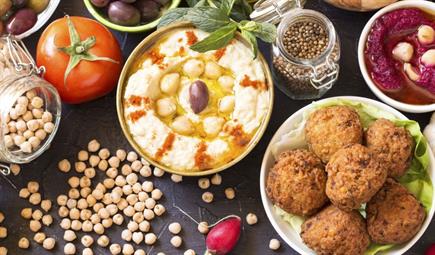Our Doctors
Meet all the doctors from Cleveland Clinic Abu Dhabi.
View Doctors
Does fasting have any effect on the body’s immune system?

As we reflect on the impact that COVID-19 may have on Ramadan traditions again this year, we may also be thinking about the effects that fasting might have on staying fit and healthy, and how it might affect the immune system.
Fasting is one of the five pillars of Islam and teaches the practice of self-discipline, self-control, and sacrifice. Muslims prepare themselves mentally by considering those less fortunate and prepare the body by increasing the amount of sleep and decreasing consumption of certain foods. If a healthy diet is maintained during the hours when eating is permitted, fasting can have many health benefits.
When a fast is broken, meals should consist of foods from all food groups; this will allow the body to transition to burning fat for energy sources, instead of glucose. This helps the body retain any muscle mass and maintain a steady weight.
A balanced diet will also control blood sugar levels and cholesterol levels, allowing better management of diabetes and high blood pressure.Drinking lots of wateris also important and is key to staying hydrated and feeling revitalized. It can also help to prevent over-indulging.
Fasting may also help to improve mood. Although tough at first, after a few days when the body has adjusted to its new eating and drinking pattern, higher levels of endorphins are released, giving a boost to mental health.
Research published by the University of Southern California has shown that prolonged fasting can lead to regeneration of the cells of your immune system.
When we begin to fast, the body initially breaks down a number of immune fighting white blood cells. It instinctively knows to start saving energy and one way it does this is by killing off old or damaged immune cells. But it quickly adjusts and triggers the regeneration of new cells, therefore increasing the number of immune boosting cells that we have.
This discovery led to further research into intermittent fasting; a fast that lasts for 16 hours a day or more. Research found that cells in the body that support the immune response and attack invading pathogens leave the blood stream when we stop eating as the nutrient content becomes low. They migrate to bone marrow, which is nutrient dense, where they begin to regenerate and become supercharged, and as a result better protect the body from infection.
As fasting will last around 12.5 hours this year, the effects of prolonged fasting may not be seen, but there are things you can do to support your immune system. It is important to eat the right types of food after dusk, containing certain key vitamins and nutrients, as they can have a direct effect on our immunity and help fight certain illnesses. Just as importantly, eating the wrong things can weaken the immune system, leaving you more vulnerable to attack from germs and viruses.
Vitamin C is one of the best-known immune boosters. Found in citrus fruits, strawberries, peppers, kale, and broccoli, it is important to try and consume your recommended daily amount, as your body can’t store or produce it.
Vitamin B6, found in bananas, green vegetables and hummus supports biochemical reactions in the immune system and Vitamin E, found in nuts and seeds is known to be a powerful antioxidant and supports your body when fighting an infection. Omega-3 fatty acids (oily fish), antioxidants (nuts and seeds) and Iron (meat and broccoli) are all other key nutrients to include in your diet to help keep you fighting fit.
Fatty and sugary foods should be avoided at Iftar as they make blood sugar levels and cholesterol levels harder to control, but they also have a negative effect on immunity. Sugar in high levels can suppress the immune response by affecting the cells that fight bacteria and fried and salty foods have been shown to cause inflammation in the gut which affects the immune response.
Try to also limit processed foods as they can have a negative impact on immunity and minimize red meat as much as possible as it also increases risk of inflammation.
Fasting may give your immune system a boost, especially if you support this with healthy and balanced choices when you break your fast.
Make sure you opt for healthy choices this Ramadan. Cleveland Clinic Abu Dhabi is here for you, day and night, to offer you the care and support you need for any health concerns you may have.

Digestive Disorders or Gastrointestinal Health: Common disorders of the digestive system reported...
Read Articles
Social Distancing: Create a sense of togetherness with loved ones whilst physical distancing. Learn...
Read Articles
Ramadan is a time of reflection, gratitude, and connecting with friends and family. Fasting from...
Read Articles